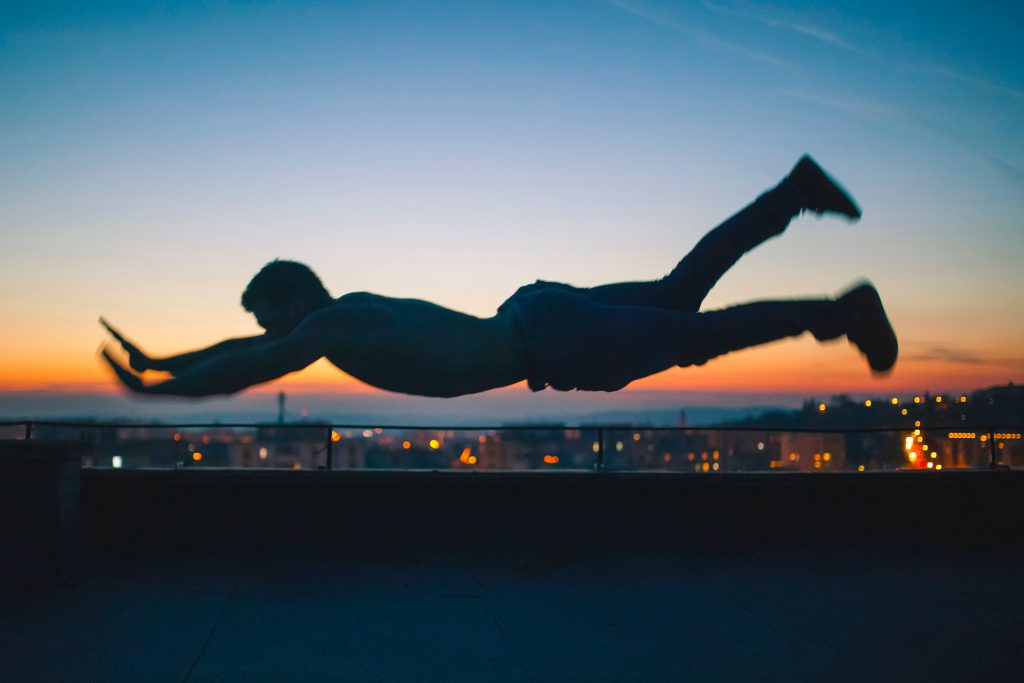
Last Friday I flew to New York to attend a bi-annual group with other therapists that I have participated in for ten years. Traveling has become more and more challenging over the past decade for a number of reasons. It requires a lot of energy and it involves navigating unfamiliar terrain, which means it is a lot easier for me to fall. In fact, the past few times I have traveled, I have fallen. The falls often occur within a day of arriving due to the combination of being in a new environment and fatigue.
I was ambitious this time and we went for dinner and a play the evening we arrived in the city. I got to the group meeting early the following morning to settle. My wife, Deb, came with me. She was talking to the woman whose office it was and I went to the bathroom. All it took was a split second lapse of concentration and I was falling backward like a felled tree.
The virtue of a hard head
I hit the back of my head on the floor, but I didn’t lose consciousness. They heard me fall. I was only a little more than an arm’s length from the doorknob, but in my situation, it didn’t matter. I couldn’t reach the doorknob and I couldn’t get up. This was not my first rodeo. I remained calm as they called the superintendent of the building to come and help. He started trying to force the door open and I was watching the wood crack and resist the force as I could hear the other group members entering into the foyer and Deb explaining what was going on.
Eventually, another building employee came and they were able to bust the door open and help me up. There were some scratches on my hand and I was likely semi-concussed. I felt a bit foggy and a headache coming on as I washed my hands, said goodbye to Deb and made my way into the group room for the beginning of a weekend-long intensive process group. My mind started going to familiar places, not wanting to stay, feeling the seduction of shame coming on. Again, not my first rodeo. I spoke for a bit early on about what happened and how I was feeling and allowed my thoughts and feelings to come and go. By the afternoon session, the fog had lifted and my headache had cleared and I pressed on.
On falling
It’s a strange sensation, to say the least when I am walking around and looking at the ground knowing a strong gust of wind or a lip in the sidewalk could put me horizontal and that I can’t get up on my own. I have fallen dozens of times over the past decade, broken my nose a handful of times and gotten some stitches. Once, a few years ago, I was alone in my house and I got up from a chair, tripped and fell forward onto my nose. If you aren’t aware, noses bleed a lot. I didn’t want my kids to come home and see me lying in a pool of my own blood and somehow I managed to get myself up and clean the blood off of the floor. I was in the bathroom washing my arms and hands when my wife and kids arrived.
What I have learned
I don’t know if all of these falls, breaks, scratches, and bruises are recorded as traumas in my body and how exactly they impact me on a daily basis. I don’t know how much to push myself to expand and explore even though it means increasing the risk of falling and hurting myself. These are questions I continue to grapple with. What I do know is that I have much more control over how I react to these situations:
- Choosing compassion over censure.
- Acknowledging the thoughts and feelings as they arise, but not letting them carry me away like a floaty in the ocean.
- Making changes to how I travel so I am more comfortable and less fatigued.
- Talking about it with others and stay connected instead of withdrawing.
- Not feeling sorry for myself.
- Not ignoring the impact, but simultaneously not letting it absorb me.
I’m back home now. We flew back Sunday evening and I have had a full week of work and I feel good, actually. One thing I can say for sure is that I am grateful I have a hard head!
***
Call now to schedule a complimentary consultation, or just fill out the contact form and click Send.
If you haven’t already read the book, it’s a great place to start: Living With Chronic Illness Handbook.
David B. Younger, Ph.D. is a clinical psychologist specializing in working with people with chronic health conditions with a web-based private practice and lives in Austin, Texas with his wife, 13-year-old son, 4-year-old daughter and 6-year-old toy poodle.
Originally published at chronicillnesstherapy.com


